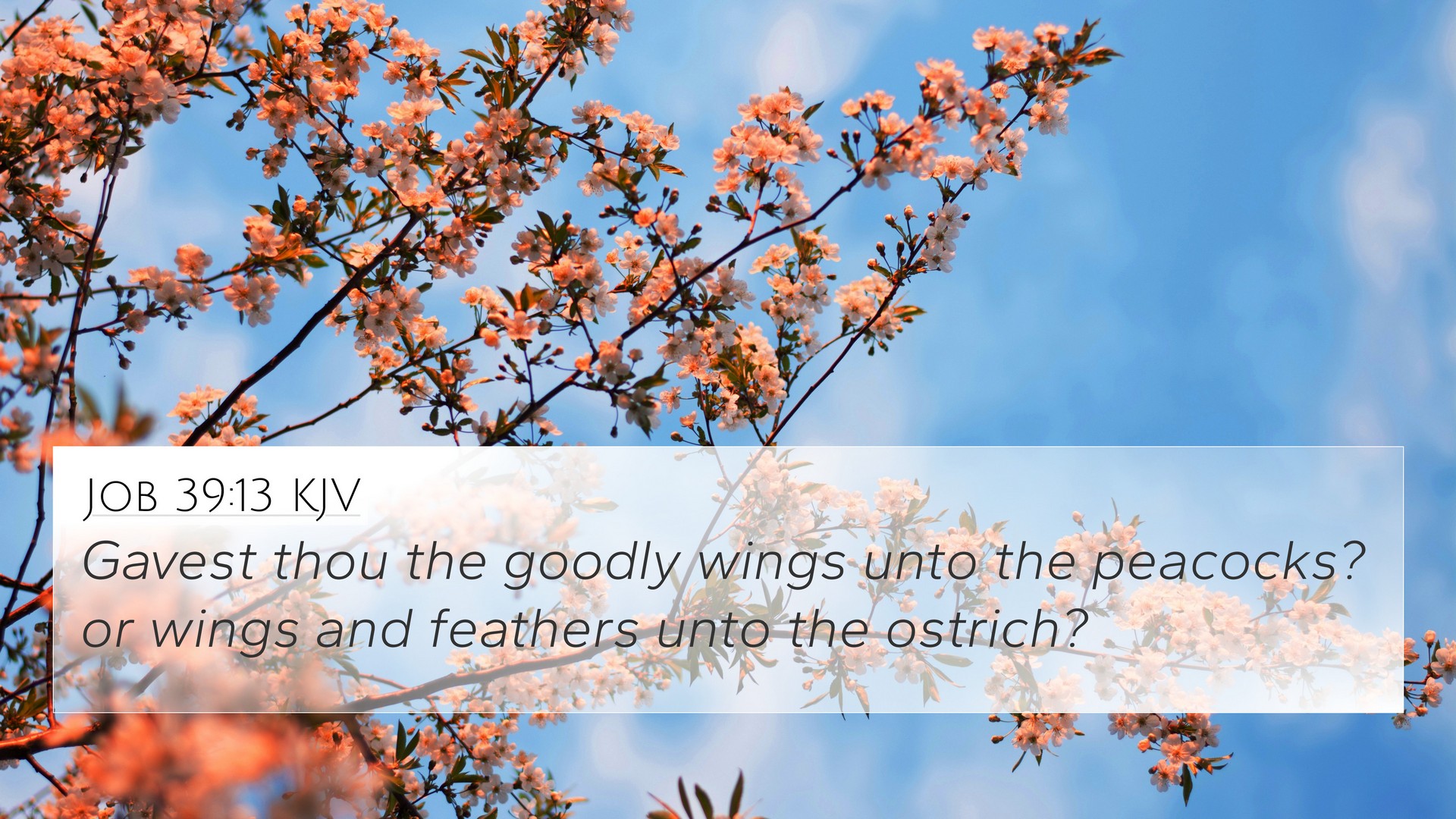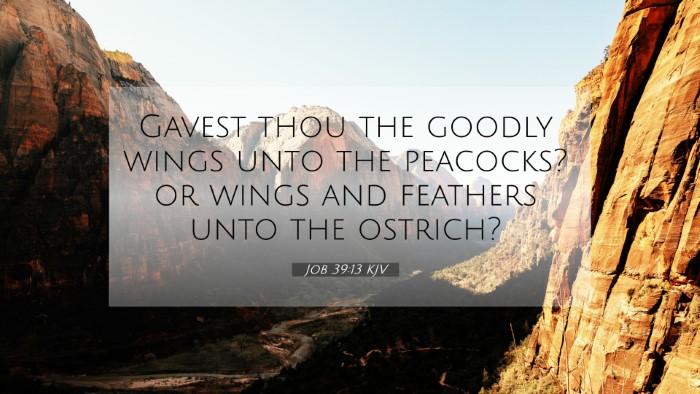Old Testament
Genesis Exodus Leviticus Numbers Deuteronomy Joshua Judges Ruth 1 Samuel 2 Samuel 1 Kings 2 Kings 1 Chronicles 2 Chronicles Ezra Nehemiah Esther Job Psalms Proverbs Ecclesiastes Song of Solomon Isaiah Jeremiah Lamentations Ezekiel Daniel Hosea Joel Amos Obadiah Jonah Micah Nahum Habakkuk Zephaniah Haggai Zechariah MalachiJob 39:13 Similar Verses
Job 39:13 Cross References
Gavest thou the goodly wings unto the peacocks? or wings and feathers unto the ostrich?
Uncover the Rich Themes and Topics of This Bible Verse
Listed below are the Bible themes associated with Job 39:13. We invite you to explore each theme to gain deeper insights into the Scriptures.
Job 39:13 Cross Reference Verses
This section features a detailed cross-reference designed to enrich your understanding of the Scriptures. Below, you will find carefully selected verses that echo the themes and teachings related to Job 39:13 KJV. Click on any image to explore detailed analyses of related Bible verses and uncover deeper theological insights.
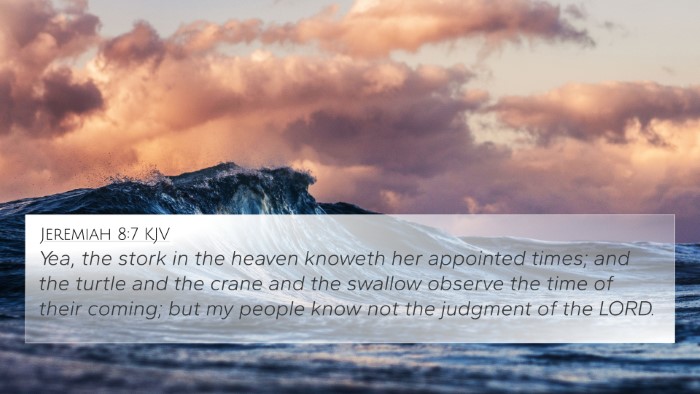
Jeremiah 8:7 (KJV) »
Yea, the stork in the heaven knoweth her appointed times; and the turtle and the crane and the swallow observe the time of their coming; but my people know not the judgment of the LORD.
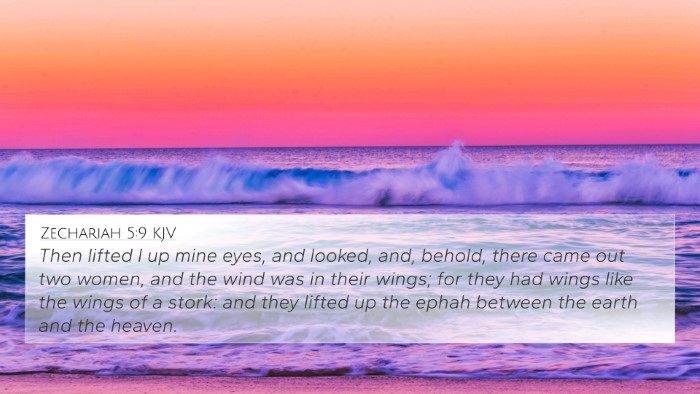
Zechariah 5:9 (KJV) »
Then lifted I up mine eyes, and looked, and, behold, there came out two women, and the wind was in their wings; for they had wings like the wings of a stork: and they lifted up the ephah between the earth and the heaven.
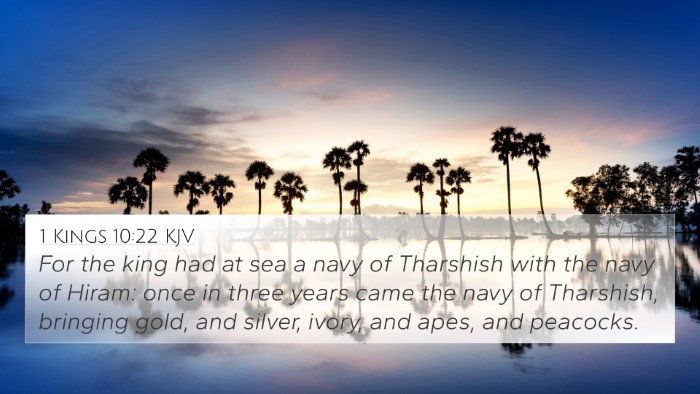
1 Kings 10:22 (KJV) »
For the king had at sea a navy of Tharshish with the navy of Hiram: once in three years came the navy of Tharshish, bringing gold, and silver, ivory, and apes, and peacocks.
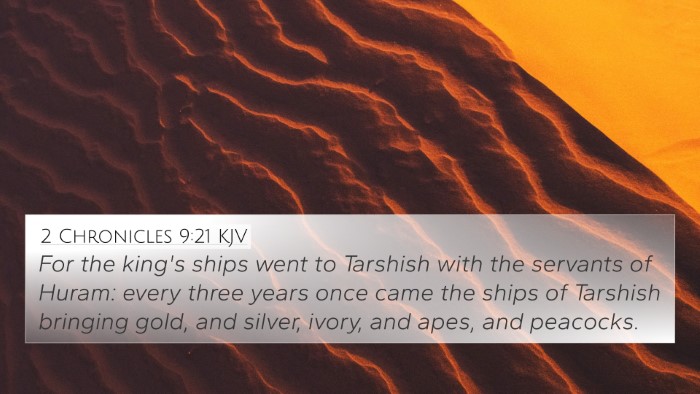
2 Chronicles 9:21 (KJV) »
For the king's ships went to Tarshish with the servants of Huram: every three years once came the ships of Tarshish bringing gold, and silver, ivory, and apes, and peacocks.
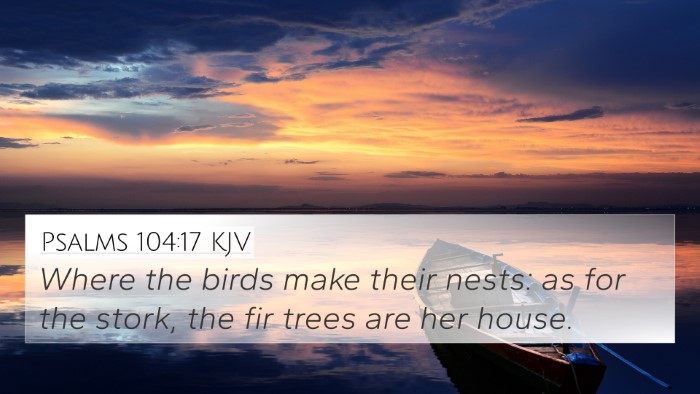
Psalms 104:17 (KJV) »
Where the birds make their nests: as for the stork, the fir trees are her house.
Job 39:13 Verse Analysis and Similar Verses
Understanding Job 39:13
Job 39:13 states: "The wing of the ostrich waves proudly, but are her wings and pinions like the kindly stork?" This verse dives deep into the examination of God's creation, specifically focusing on the ostrich and her unique traits, and presents an opportunity to explore the characteristics of God's creatures in a comparative analysis with other beings.
Verse Meaning Overview
In this verse, Job is highlighting the distinct capabilities of the ostrich, particularly its impressive wings. Despite their size and the ostentation with which they are displayed, the wings of the ostrich are not equipped for flying. This brings to light God's design of various creatures, emphasizing their unique attributes and limitations.
Thematic Bible Verse Connections
The themes presented in Job 39:13 resonate through various passages in the Bible, encouraging readers to link and reflect on different verses that contribute to a deeper understanding of God's creations and their purposes. Below are several thematic connections found across scriptures:
- Genesis 1:20-22 - The creation of birds and their flight.
- Matthew 6:26 - God's provision for birds, underscoring His care for all creatures.
- Psalms 104:25-26 - The majesty of creation, including the creatures of the sea and sky.
- Isaiah 40:31 - Those who wait on the Lord will soar like eagles, contrasting the flight of birds with the limitations of the ostrich.
- Leviticus 11:13-19 - Classification of birds, wherein the ostrich is mentioned as an unclean animal.
- Proverbs 30:18-19 - The mystery of various creatures, including the eagle and the serpent, aligning with the creature's characteristics.
- Job 39:14 - Continues the discussion about the ostrich's behavior in nesting and raising its young.
- Jeremiah 48:40 - Use of the ostrich as a metaphor for a lack of nurturing, illustrating the nature of God's creatures.
- Zephaniah 3:19 - God's promise to bring back the outcasts, showcasing His compassionate nature to all beings.
- Ecclesiastes 3:19-21 - Questions surrounding the fate of animals and man in God's creation, leading to further contemplation of life's purpose.
Comparative Bible Verse Analysis
Job’s reference to the ostrich invites a comparative study of the traits found within different species, particularly in how they reflect God's creative will. The ostentation of the ostrich’s wings invites a contrast with the stork, a bird recognized for its nurturing and parenting attributes, signifying that not all showy features convey the same utility or purpose within creation.
Insights from Public Domain Commentaries
Matthew Henry notes that God's wisdom is exhibited through the crafting of every creature, suggesting that the ostrich's deficiency in flight symbolizes a greater truth: that all creation has its place and purpose. The ostentatious display of the ostrich’s wings may invoke pride, yet this trait is juxtaposed with its inability to fly, underscoring humility found in God's design.
Albert Barnes refers to how the ostentatious appearance of certain creatures does not always guarantee their ability to fulfill the functions typically assigned to wings, inviting the reader to reflect on the potential symbolic meaning behind the ostentation.
Adam Clarke emphasizes the practical aspect of creation, remarking that while the ostrich's wings are grand, they serve little purpose compared to those of a stork that can fly great distances, highlighting an important lesson on appearances versus functional attributes.
Scriptural Cross-Referencing
The use of cross-references within the Bible can enrich one’s study and understanding of scripture. Tools for Bible cross-referencing, such as a Bible concordance or a cross-reference Bible study guide, can be instrumental in identifying connections between Job 39:13 and contrasting or complementary verses. Engaging in cross-referencing Bible study methods can uncover the intricate web of biblical narratives that harmonize with each other.
Conclusion: Embracing the Complexity of God's Creation
Job 39:13 ultimately reflects the complexity of creation. Understanding the diversity of God’s design—such as the ostrich's prominent wings yet inability to fly—prompts a deeper exploration of the role of each creature within the tapestry of life. As such, engaging with biblical cross-references enriches one’s understanding of divine creation, leading to a holistic interpretation of scriptures.
Further Study and Reflection
In further study, consider how each biblical reference connected to Job 39:13 embodies the themes of creation, purpose, and divine wisdom. Reflect on how you might draw parallels between seemingly unrelated verses, thereby enhancing your theological understanding and encouraging a dynamic approach to scripture.
